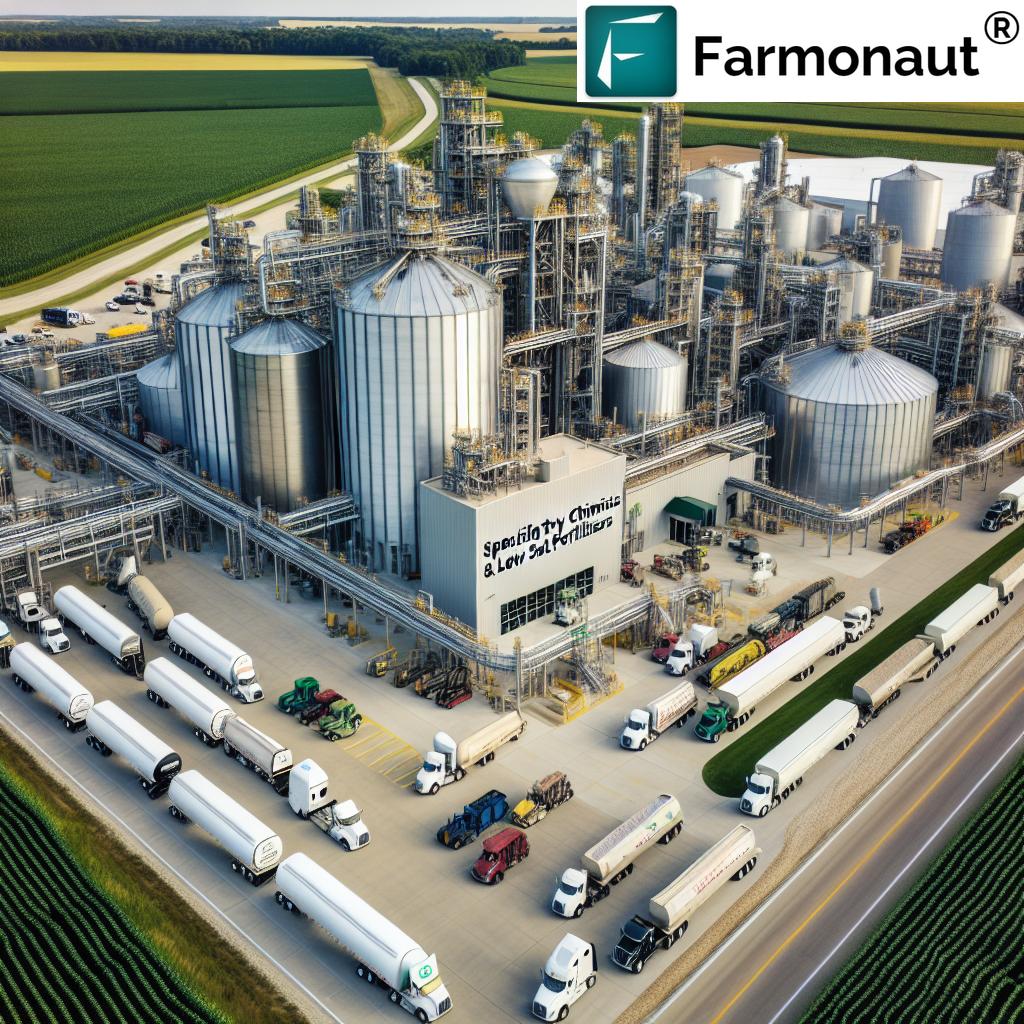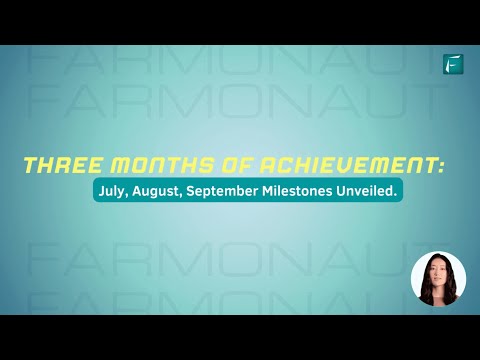Waterloo’s $3.95M Fertilizer Expansion Grant: Boosting Iowa Agriculture and Lowering Costs for Farmers
“Waterloo’s $3.95M grant will expand fertilizer production, aiming to produce millions of pounds of specialty chemicals by 2027.”
In a significant development for Iowa’s agricultural landscape, Waterloo is set to witness a major transformation in fertilizer production, thanks to a substantial $3.95 million federal grant. This investment in agricultural chemical manufacturing is poised to have far-reaching effects, potentially lowering fertilizer costs for farmers and food prices for consumers. As we delve into the details of this exciting project, we’ll explore how it aligns with the USDA’s efforts to modernize equipment, adopt new technologies, and support independent businesses in the agriculture sector.
The Grant: A Catalyst for Agricultural Growth
The Fertilizer Production Expansion Program (FPEP) grant, awarded to Hydrite Chemical Co., marks a pivotal moment for Waterloo’s agricultural industry. This family-owned manufacturer and distributor, based in Brookfield, Wisconsin, has been a key player in providing farmers with specialty and commodity chemicals used across various agricultural production applications. The grant’s primary objective is to expand production facilities in both Waterloo, Iowa, and Terre Haute, Indiana.
Let’s break down the key aspects of this grant and its potential impact:
- Grant Amount: $3.95 million
- Locations: Waterloo, Iowa (2815 WCF & N Drive) and Terre Haute, Indiana
- Focus: Expansion of fertilizer production capacity
- Expected Outcomes: Increased production of specialty chemicals and low-salt fertilizers
- Projected Timeline: Significant production increases by 2027
Projected Impact on Production
The expansion project is expected to yield impressive results by 2027:
- 10 million pounds of potassium thiosulfate
- 2 million pounds of low-salt fertilizer
These projections underscore the significant scale of the expansion and its potential to reshape the local and regional agricultural chemical market.

The Role of FPEP in Agricultural Advancement
The Fertilizer Production Expansion Program, funded by the USDA’s Commodity Credit Corporation, plays a crucial role in supporting independent business owners in the agricultural sector. Its primary objectives include:
- Modernizing equipment
- Adopting new technologies
- Building production plants
- Enhancing overall agricultural infrastructure
By providing grants to companies like Hydrite Chemical Co., FPEP is actively contributing to the evolution of fertilizer production techniques and their potential impact on crop yields and food security.
Potential Benefits for Farmers and Consumers
The expansion project in Waterloo is expected to bring about several positive outcomes:
- Lower Fertilizer Costs: Increased production capacity may lead to more competitive pricing, potentially reducing input costs for farmers.
- Improved Crop Yields: Access to advanced fertilizers could enhance soil fertility and crop productivity.
- Food Price Stability: Lower production costs may contribute to more stable food prices for consumers.
- Economic Boost: The expansion could create new jobs and stimulate economic activity in the Waterloo area.
- Innovation in Agriculture: The project may spur further advancements in fertilizer technology and farming practices.
“The federal grant targets two facilities in Waterloo, Iowa and Terre Haute, Indiana for agricultural chemical manufacturing expansion.”
Specialty Chemicals: A Focus on Potassium Thiosulfate
One of the key products that will see increased production through this expansion is potassium thiosulfate. This specialty chemical plays a vital role in modern agriculture:
- Provides both potassium and sulfur, essential nutrients for plant growth
- Improves nutrient uptake efficiency
- Enhances crop quality and yield
- Compatible with many irrigation systems for efficient application
The projected increase in potassium thiosulfate production could significantly impact farmers’ ability to optimize their crop nutrition strategies.
Low-Salt Fertilizers: A Step Towards Sustainable Agriculture
Another focus of the expansion is the production of low-salt fertilizers. These innovative products offer several advantages:
- Reduced soil salinity, which can be detrimental to plant growth
- Minimized risk of fertilizer burn on crops
- Improved water retention in soil
- Enhanced nutrient uptake by plants
By increasing the availability of low-salt fertilizers, the project aims to promote more sustainable and environmentally friendly farming practices.
Technological Advancements in Fertilizer Production
The grant-funded expansion is expected to incorporate cutting-edge technologies in fertilizer production. Some potential advancements include:
- Precision blending systems for custom fertilizer formulations
- Advanced process control systems for improved quality and consistency
- Energy-efficient production methods to reduce environmental impact
- Automated packaging and distribution systems for faster delivery to farmers
These technological improvements could significantly enhance the efficiency and effectiveness of fertilizer production in Waterloo.
Impact on Local Economy and Job Market
The expansion project is expected to have a positive impact on Waterloo’s economy:
- Creation of new jobs in manufacturing and related industries
- Increased demand for local services and suppliers
- Potential for attracting related businesses to the area
- Enhanced tax revenue for local government
This economic boost could have ripple effects throughout the community, contributing to overall growth and development in Waterloo.

Environmental Considerations
While the expansion of fertilizer production brings numerous benefits, it’s crucial to consider potential environmental impacts:
- Increased energy consumption and associated emissions
- Water usage in production processes
- Proper handling and disposal of chemical byproducts
It’s likely that the project will incorporate environmentally friendly practices and technologies to mitigate these concerns and align with sustainable development goals.
The Role of Technology in Modern Agriculture
As we witness this significant investment in fertilizer production, it’s worth noting the broader technological advancements in agriculture. Companies like Farmonaut are at the forefront of this agricultural revolution, offering innovative solutions that complement traditional farming practices.
Farmonaut provides advanced, satellite-based farm management solutions via Android, iOS, web/browser App, and API. Their platform offers valuable services such as:
- Real-time crop health monitoring
- AI-based advisory systems
- Blockchain-based traceability
- Resource management tools
These technologies can help farmers optimize their use of fertilizers and other resources, potentially amplifying the benefits of increased fertilizer production in Waterloo.
Explore Farmonaut’s solutions:
The Future of Fertilizer Production in Waterloo
As we look ahead to 2027 and beyond, the fertilizer production expansion in Waterloo holds promise for significant advancements in agricultural productivity. Some potential future developments include:
- Integration of AI and machine learning in fertilizer formulation
- Development of nano-fertilizers for enhanced nutrient delivery
- Increased focus on bio-based and organic fertilizer alternatives
- Collaboration with precision agriculture technologies for optimized fertilizer application
These advancements could further enhance the impact of the current expansion project, solidifying Waterloo’s position as a hub for agricultural innovation.
Projected Impact of Waterloo’s Fertilizer Expansion Grant
| Category | Current Estimate | Projected by 2027 | Potential Impact |
|---|---|---|---|
| Fertilizer Production Capacity (lbs) | Not specified | 12+ million | Significant increase in supply |
| Potassium Thiosulfate Output (lbs) | Not specified | 10 million | Enhanced crop nutrition options |
| Low-Salt Fertilizer Production (lbs) | Not specified | 2 million | Promotion of sustainable farming |
| Estimated Cost Reduction for Farmers (%) | 0% | 5-15% (estimated) | Improved profitability for farmers |
| Projected Impact on Food Prices (%) | 0% | 1-3% decrease (estimated) | Potential savings for consumers |
| Job Creation in Waterloo | Current employment | 50-100 new jobs (estimated) | Economic growth in the region |
| Environmental Benefits | Standard practices | Reduced carbon footprint, improved efficiency | More sustainable agricultural sector |
Note: Projections are estimates based on available information and industry trends. Actual outcomes may vary.
Challenges and Considerations
While the fertilizer production expansion in Waterloo brings numerous benefits, it’s important to address potential challenges:
- Market fluctuations affecting fertilizer demand
- Regulatory changes in environmental policies
- Competition from other fertilizer producers
- Balancing increased production with sustainable practices
Addressing these challenges will be crucial for the long-term success of the expansion project and its impact on the agricultural sector.
The Role of Precision Agriculture
As fertilizer production expands, the importance of precision agriculture in optimizing its use becomes even more critical. Technologies offered by companies like Farmonaut can play a significant role in this optimization:
- Satellite-based crop health monitoring for targeted fertilizer application
- AI-driven recommendations for fertilizer usage based on crop needs
- Integration of weather data for optimal timing of fertilizer application
- Tracking and analysis of fertilizer effectiveness over time
By combining increased fertilizer availability with precision agriculture techniques, farmers can maximize the benefits of both advancements.
Explore Farmonaut’s API for developers: Farmonaut API
Access Farmonaut’s API Developer Docs: API Developer Docs
Community and Stakeholder Engagement
The success of the fertilizer production expansion in Waterloo will largely depend on effective engagement with various stakeholders:
- Local farmers and agricultural cooperatives
- Environmental groups and regulatory bodies
- Waterloo city council and economic development agencies
- Educational institutions for research and workforce development
Ongoing dialogue and collaboration with these groups will be essential for addressing concerns, maximizing benefits, and ensuring the project’s long-term success.
Earn With Farmonaut
Earn 20% recurring commission with Farmonaut’s affiliate program by sharing your promo code and helping farmers save 10%. Onboard 10 Elite farmers monthly to earn a minimum of $148,000 annually—start now and grow your income!
Learn more about Farmonaut’s Affiliate Program
Conclusion: A New Era for Waterloo’s Agricultural Sector
The $3.95 million federal grant for fertilizer production expansion in Waterloo marks the beginning of an exciting new chapter for Iowa’s agricultural industry. By increasing the production of essential fertilizers and specialty chemicals, this project has the potential to significantly lower costs for farmers, improve crop yields, and ultimately benefit consumers through more stable food prices.
As we look towards 2027 and beyond, the impact of this expansion will likely extend far beyond the immediate increase in production capacity. It represents a commitment to innovation, sustainability, and economic growth in the agricultural sector. By embracing new technologies, addressing environmental concerns, and fostering collaboration among various stakeholders, Waterloo is positioning itself as a leader in modern agricultural chemical manufacturing.
The success of this project could serve as a model for similar initiatives across the country, demonstrating how targeted investments in agricultural infrastructure can yield wide-ranging benefits for farmers, consumers, and local economies. As the project progresses, it will be crucial to monitor its outcomes, address challenges proactively, and continue to adapt to the evolving needs of the agricultural industry.
Ultimately, the fertilizer production expansion in Waterloo is not just about increasing output; it’s about cultivating a more resilient, efficient, and sustainable agricultural ecosystem that can meet the challenges of feeding a growing global population while preserving our natural resources for future generations.
FAQ Section
Q: How will the $3.95 million grant be utilized in Waterloo?
A: The grant will be used to expand fertilizer production facilities, focusing on increasing the output of specialty chemicals like potassium thiosulfate and low-salt fertilizers.
Q: When are the projected production increases expected to be realized?
A: The expansion project aims to achieve significant production increases by 2027, including 10 million pounds of potassium thiosulfate and 2 million pounds of low-salt fertilizer.
Q: How might this expansion affect fertilizer costs for farmers?
A: The increased production capacity is expected to potentially lower fertilizer costs for farmers, though the exact reduction will depend on various market factors.
Q: Will this project create new jobs in Waterloo?
A: While specific numbers haven’t been provided, expansion projects of this scale typically create new job opportunities in manufacturing and related industries.
Q: How does this expansion align with sustainable agriculture practices?
A: The focus on low-salt fertilizers and potential incorporation of energy-efficient production methods aligns with more sustainable agricultural practices.






